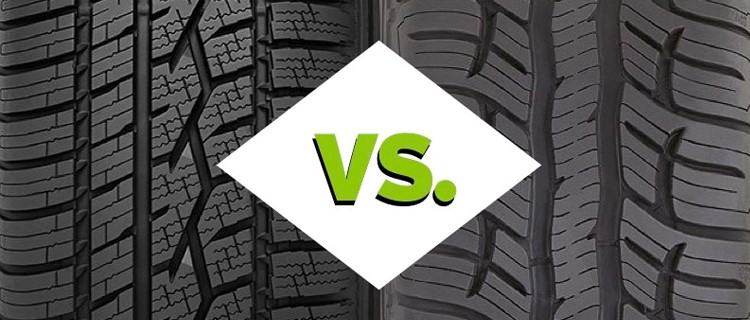All Weather Tires vs. All Season Tires: Top-4 Consumer Considerations
October 1, 2020
All Season Tires

What’s the difference between all-weather tires and all-seasons? Today’s post breaks it down and shares the top-4 consumer considerations you must make for the perfect tire purchase.
1. Will I be driving in harsh winter conditions?
To find tires that work year-round, the first thing you’ll need to consider is your seasonal driving conditions.
All-season tires are sometimes referred to as “three-season” tires because they do not meet the Rubber Association of Canada’s severe snow safety requirements, and their performance drops off at temperatures below 7°C. Their tread pattern is designed primarily to reduce noise and provide low-rolling resistance, rather than increasing stability on slippery roads. Generally speaking, all-seasons are intended for use only in warm, dry, and mild wet conditions.
All-weather tires, on the other hand, are suitable for mild winter conditions with heavy rain, snowfall, and slush. They’re made using a rubber compound that’s designed to flex, grip, and perform at temperatures above and below 7°C, and their aggressive tread design and siping offers impressive winter slip-resistance, while still providing sensitive handling in warmer conditions.
However, if you live in an area that gets absolutely blasted by snow, ice, and sleet during the winter, winter specific tires are your best bet.
2. How much tire storage space is available?
Many Canadian drivers use all-seasons during mild months, then switch over to winter tires to get through the frosty weather. This is a great way to extend the life of both sets of tires, but not everyone has the extra storage space required to stow four bulky tires. If storage space is an issue, and you don’t live somewhere with harsh winter conditions, all-weather tires are the perfect solution, allowing you to drive around safely year-round on a single set.
3. Do winter tire laws apply to me?
In some parts of the country, drivers must invest in winter-ready tires. For instance, winter tires are mandatory in Quebec for all drivers from December 15th to March 15th. They’re also mandatory in British Columbia on specific highways. If you live somewhere where these laws apply, you have one of two options:
- Invest in all-weather tires—Most top brands’ all-weather tires display the Three-Peak Mountain Snowflake Symbol (also referred to as the ‘Alpine’ symbol), which indicates they meet the Rubber Association of Canada’s severe snow performance requirements. Accordingly, in some jurisdictions, all-weather tires are sufficient.
- Buy all-seasons tires for summer and winter tires for winter—in provinces with harsh winters and strict tire laws, dedicated winter tires may be necessary. Buying a set of all-seasons for the warmer months will increase your fuel economy, comfort, and on-road performance, while also increasing the longevity of your winter tires.
4. Am I willing to invest in seasonal tire changes?
For most Canadians driving on all-season tires, seasonal tire changes are just part of life. All-weather tires, on the other hand, work year-round, so you can cut the costs of multiple tire changes. But remember: when you drive on all-weather tires year-round, they wear out much faster than seasonal swap-outs!
End the all-weather tire vs. all season debate: Find a local TIRECRAFT
Do you have more questions about all-weather tires vs. all-seasons? Well, we’ve got answers.
For expert tire consultations FREE of charge, use the Find a TIRECRAFT tool and get in touch with our team.
Back

